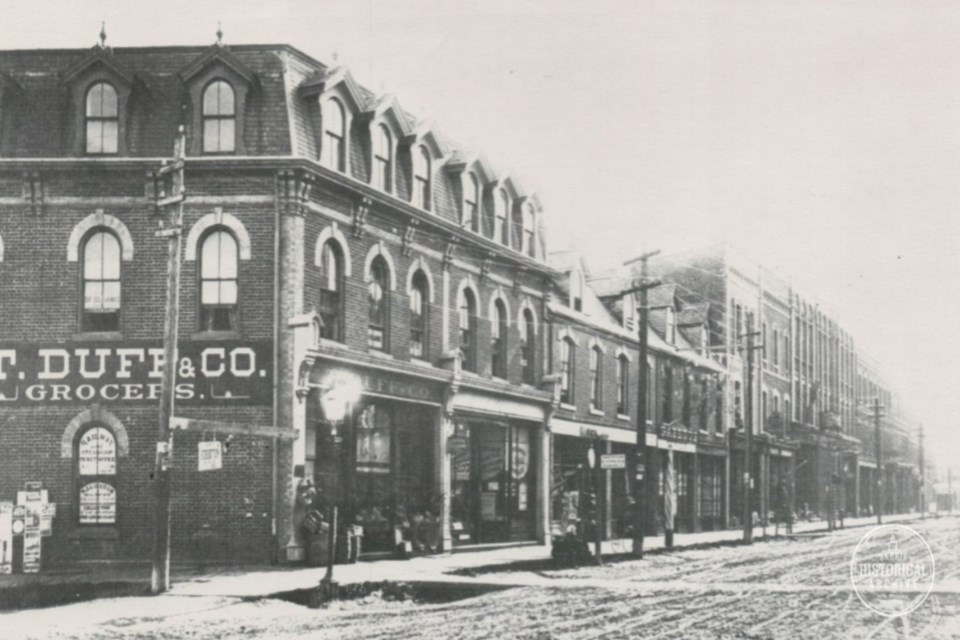I suspect he was a grand storyteller. He must have been as his presentation to the local chapter of the Women’s Canadian Club on Jan. 10, 1928 was crashed by an assortment of non-members, locals and what the Barrie Examiner described as “a sprinkling of old timers.”
John Henry ‘J.H.’ Bennett spoke for two hours to a packed house of some 200 people in the auditorium of Barrie Collegiate Institute.
J.H. had some unique perspectives. He was born in Barrie in 1857, during a time when men and women were making Barrie, and Barrie was making men and women. The village on the bay was quickly emerging from the woods, giving opportunity to newcomers who arrived with nothing at all to rise along with it.
J.H.’s father, Humphrey Bennett, arrived in this country from County Cavan, Ireland in 1836. He was then just 12 years old and travelled to Toronto with his recently widowed mother and his eight siblings. More than likely, the youngster went to work soon after, given the family’s circumstances.
The senior Bennett learned the tailoring trade and brought his skills to Barrie in 1853. Not long after his arrival in Barrie, he married Annie Fraser, a daughter of pioneering hotel keeper, Henry Fraser.
The younger Bennett too married into Barrie inn keeping royalty. In 1885, J.H. Bennett married Fannie Augusta Meeking, daughter of Edwin Sydney Meeking.
Starting as a railway mail service clerk right out of school, J.H. Bennett was eventually made chief clerk but, when that position was abolished, he went into the insurance business. Thereafter, he entered into a long political career with several stints as reeve, town councillor and one term as mayor.
The list of boards, clubs and commissions that J.H. Bennett involved himself in was extensive. His hobbies and interests were numerous as well so it is evident that he was known by everyone in town.
The Barrie Examiner headline proclaimed “Old Time Stuff” above the account of Bennett’s talk. Apparently, based on the enthusiastic crowd, 'old time stuff' wasn’t necessarily old boring stuff.
“It was a story of ‘Old Barrie’ told in characteristic fashion as only Mr. Bennett could tell it. He prefaced his remarks with a short resume of the struggle waged between Tollendal, Kempenfeldt (Fisherman’s Point) and Barrie for the town site.”
We all know how that battle turned out. Mr. Bennett, by then 70 years old, told stories of the Barrie of his youth and painted, in words, a picture of the town as it was 50 and 60 years earlier.
He recalled the area bordered by Bayfield, Mulcaster, Collier and McDonald streets in former days. The centre of this place was once known as the H-Block and is now the site of the Barrie Public Library, but, in J.H. Bennett’s earliest memories, it was vacant low-lying ground which was used for curling in the winter, a cow pasture in summer and as an occasional venue for travelling circuses.
J.H. remembered the years when both of the town’s newspapers, the Barrie Examiner and the Northern Advance, existed side by side in adjoining offices across from the Clarkson Hotel even though they were bitter rivals.
The speaker remembered, with some amusement, the strong opinions that were voiced over the purchase of a steam engine to fight fires during that particularly incendiary decade, the 1870s. Should it be a piston or a rotary machine, spray or full stream water, a Silsby or a Clapp & Jones model? Supporters, with near religious zeal, offered to promote their choice by words or by fist, if necessary.
After all, as J.H. Bennett added: “They needed to as Barrie was a veritable fire trap of frame buildings.”
Some of the businessmen of Barrie stuck in J.H. Bennett’s recollection as well. David Vanevery ran a livery stable on the 1860s and hired out horses, buggies and drivers to the public. For a fee of 15 cents, he offered a shuttle service between the railway station platform and any hotel in Barrie.
To the shock of the audience, J.H. relayed that George Maundrell, auctioneer, fire fighter and butcher once operated a slaughter house right on the corner of Dunlop and Mulcaster streets.
Alexander Sibbald was referred to by J.H. Bennett as the grand poobah of Barrie as he seemed to be in charge of everything that needed doing in Barrie including bell ringing, snow clearing at public buildings, fire wood supplying, painting, and other odd jobs.
At the end of the talk, Frank Moberly, a son of Barrie, born here in 1845, stood and made a motion that the whole of the audience should offer Mr. Bennett their heartfelt thanks. The motion was seconded by Emma King, teacher at the Central School for 40 years and daughter of Robert King, also a very early settler.
Each week, the Barrie Historical Archive provides BarrieToday readers with a glimpse of the city’s past. This unique column features photos and stories from years gone by and is sure to appeal to the historian in each of us.



